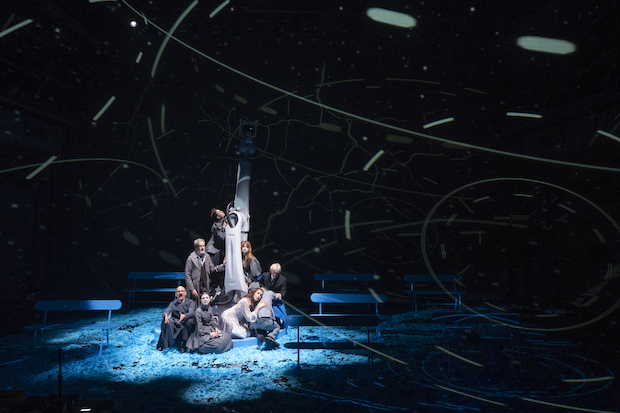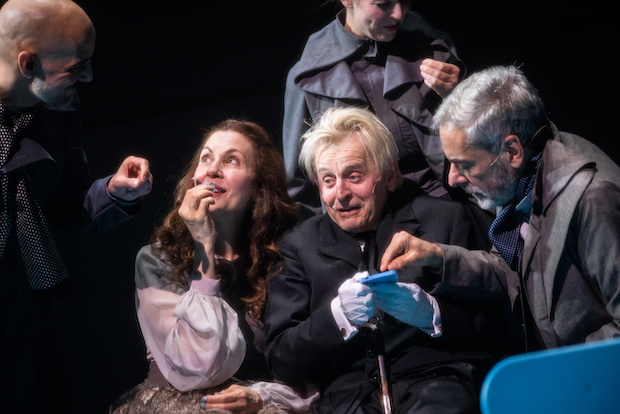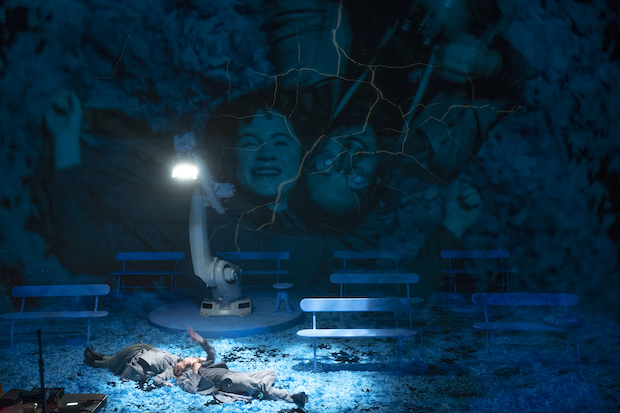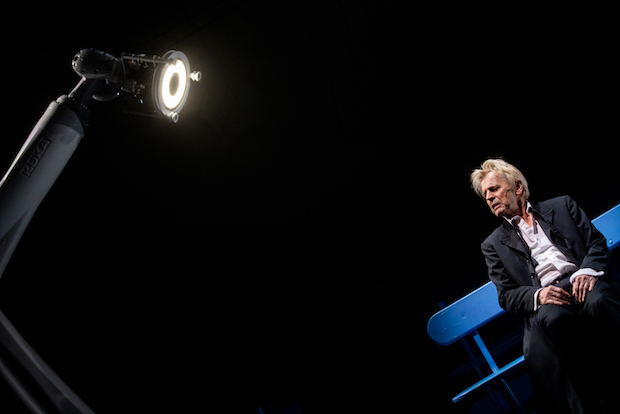Review: Chekhov's The Orchard, the Violence of Progress, and the Illusion of Choice

(© Pavel Antonov)
The ballet is entrancing — full of bends, twirls, and surprise jumps choreographed with precision and executed to perfection. I'm not talking about the dancing abilities of Mikhail Baryshnikov, but his robot co-stars in The Orchard, the new adaptation of Anton Chekhov's The Cherry Orchard (translated by Carol Rocamora), now appearing live at Baryshnikov Arts Center and streaming to an audience worldwide.
There are two robots: A KUKA arm occupies center stage, playing several parts while also providing closeup shots for the at-home audience. A Unitree Go1 prances around the stage as the family dog (robotics design by Tom Sepe). It's certainly the most impressive display of robotics I've ever witnessed onstage — and I would have never dreamed I would be seeing this kind of machinery in a 118-year-old Chekhov play. But time spins mercilessly forward, as the play shows us.
Baryshnikov performs double-duty as the elderly servant Firs and Chekov himself — but you wouldn't know the latter unless you bought a ticket to the interactive online portion. Conceived and directed by Igor Golyak for Arlekin Players Theatre's (zero-G) Lab, The Orchard seems to be the next step in that company's mission to pioneer virtual theater (a form that blends elements of cinema, videogames, and good old-fashioned live performance) following last year's ChekhovOS. This complicated hybrid stage-streaming show is produced in association with the Cherry Orchard Festival Foundation, Groundswell Theatricals, Inc., and ShowOne Productions. Robots, projections, live video, an online auction, and a live chat: It's impressive to see how many plates Golyak and company keep spinning, even if it isn't always clear why they're spinning in the first place.

(© Maria Baranova)
At the center of this hurricane of experimentation is a well-known story about a family of Russian aristocrats led by Lyubov Ranevskaya (Jessica Hecht) and her brother, Leonid Gaev (Mark Nelson). Deep in debt, their ancestral cherry orchard is about to be auctioned off. Yermolai Lopakhin (Nael Nacer), a middle-class descendant of the very serfs who once worked the orchard, has a plan to save the estate: Parcel it up into dachas. But none of them will consider it seriously, with Ranevskaya hoping an older business plan will save the family: marriage. Her daughters, Varya (Elise Kibler) and Anya (Juliet Brett), both have their prospects, or so they think. But how much can they really control the shifting sands beneath their feet?
I wondered if the choices presented in the interactive version of The Orchard were just an illusion as well. Designed by Alexander Huh, it invites online viewers to rush up the stairs and poke behind the doors of the Baryshnikov Arts Center, like Lara Croft if she raided off-Broadway theaters instead of tombs. My time in this Chekhovian videogame wasn't long enough to explore behind every door, and once I had chosen one, the others became off-limits (a somewhat apt metaphor for life).
Within 10 minutes, I was virtually ushered into the theater to watch the same show the in-person audience sees, but with closer camera angles (excellent photography direction by Leanna Keyes). Occasionally, we are given the choice between two cameras, and it was fun to toggle between them during key scenes, especially when we are given access to the robot cam. If the high-tech form of The Orchard doesn't necessarily spring from the content, it at least gives us new ways to look at an old tale.

(© Pavel Antonov)
Golyak has made other choices to transport The Cherry Orchard out of its expected setting: The show is performed on what appears to be a park outside of Chernobyl which is experiencing a toxic winter (scenic design by Anna Fedorova, lights by Yuki Nakase Link). Oana Botez costumes the actors in pleated fabric, creating silhouettes that suggest the turn of the last century as well as that of the next. Alex Basco Koch projects live and recorded video onto the scrim separating the stage from the audience, creating a membrane of memory that echoes through Tei Blow's sound design.
Bluntly, Golyak (a native of Ukraine) has transformed the stranger of Act 2 into a soldier (unnervingly aggressive performance by Ilia Volok). Drunk as a skunk and slurring in Russian, he attempts to get the group to join in a song as they huddle, terrified, around the robot arm (the home audience can watch this moment from the soldier's helmet cam). It's a clear response to the imperialist notion of "Russkiy Mir": Fuck off.

(© Maria Baranova)
Golyak's vision is supported by strong performances. Deaf actor John McGinty plays the "eternal student" Trofimov, delivering a maddening depiction of a failure to communicate: As he signs to Anya about the estate's foundation in slavery, she assumes he can think only of love. Hecht makes a sentimental (and surprisingly calculating) Ranevskaya, using one of her off-stage breaks to answer questions about the property to online bidders, like a celebrity doing an Instagram Q&A. Nacer's Lopakhin is driven by a fascinating blend of affection and resentment, making his final victory feel both justified and pyrrhic. A tense scene between Nacer and McGinty seems to portend the major conflict to come now that the old aristocrats have been completely sidelined.
And then there's poor Firs, left behind with the robots to gather dust like a first-generation BlackBerry in a kitchen drawer. With a performance that is both comic and relatable, Baryshnikov makes this moment unspeakably sad, even as it is inevitable. We're all slaves to the assumptions of our time, until time marches on without us. Even when their experiments don't always work, I'm glad this company is making such an effort to take the next step in live theater.











